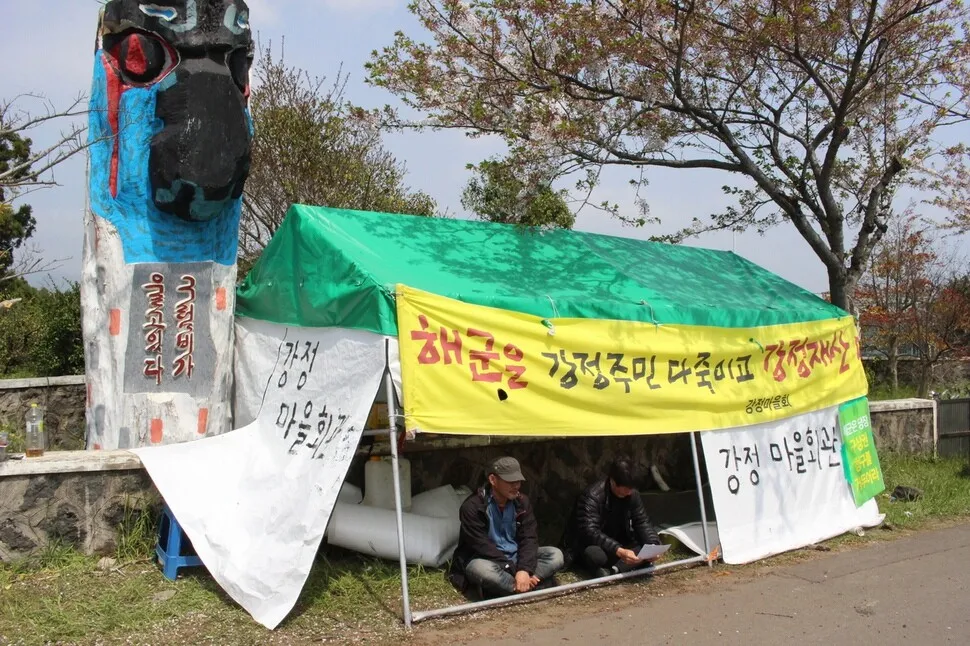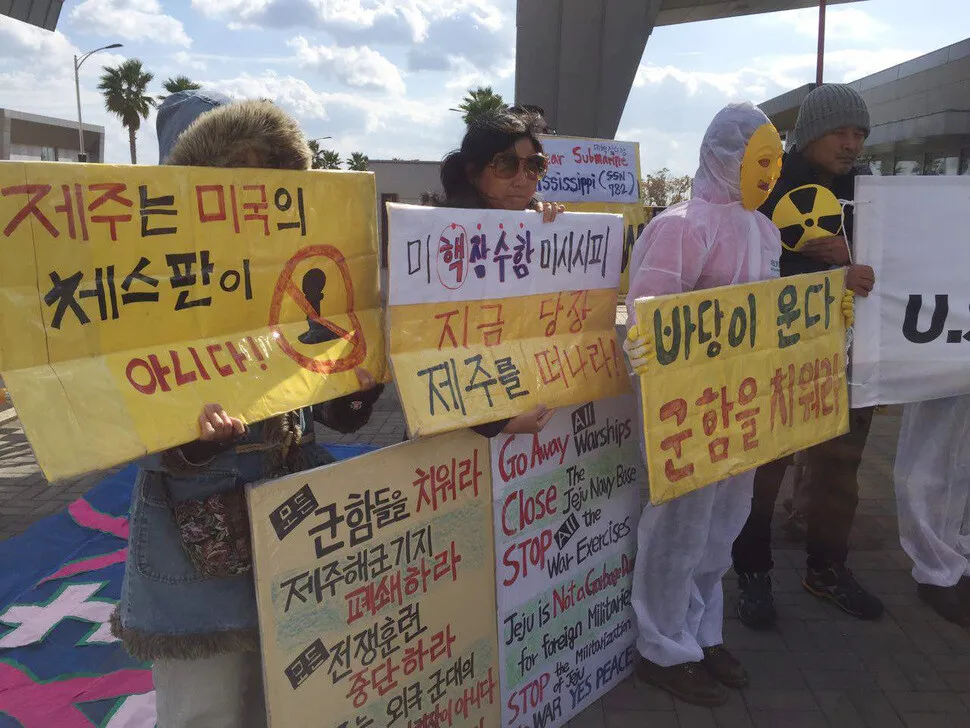hankyoreh
Links to other country sites 다른 나라 사이트 링크
Government drops lawsuit against Gangjeong Village residents

The South Korean government has decided to drop a lawsuit filed against civic groups and the residents of Gangjeong Village in Jeju demanding that they pay 3.45 billion won (US$3.16 million) in damages. This sets the stage for settling the conflict over the construction of the Jeju Civilian-Military Complex Port, also known as the Jeju Naval Base, at Gangjeong Village that has lasted for more than ten years now.
During a cabinet meeting headed by Prime Minister Lee Nak-yeon on Dec. 12, the government decided to accept a proposal resulting from compulsory court mediation that would drop the indemnity lawsuit against Gangjeong Village. On Nov. 30, the court submitted a proposal to the government suggesting that it drop the lawsuit and that both sides agree not to make claims in civil or criminal court. By accepting the court’s proposal, the government agrees to withdraw its claim of 3.45 billion won in damages against 116 protestors (including 31 villagers) and five civic groups.
“In line with the opinion of the cabinet members, we will respect the judiciary’s decision and accept the results of mediation. We are making this decision for the higher purpose of conflict resolution and national unity. We hope that withdrawing our indemnity claim will create an opportunity for both the South Korean Navy and the Gangjeong villagers to forge a harmonious and mutually beneficial community for a better tomorrow,” Lee said after the motion was passed in the cabinet meeting.
“The decision was made to accept the proposal mediated by the court for the higher purpose of conflict resolution and national unity,” the Ministry of Defense echoed in a government position statement.

Dropping the lawsuit against Gangjeong Village was one of President Moon Jae-in’s campaign pledges. During a visit to Jeju while he was running for president, Moon promised to “have the navy drop its lawsuit for damages against Gangjeong Village and pardon those who are subject to legal action.”
This is also in line with Moon’s plan to have the government refrain from appealing judicial decisions. This past July, Moon said it was not appropriate for the government to exploit the overwhelming information and resources at its disposal to wage legal warfare against ordinary citizens and groups and ordered the government not to appeal when it lost state litigation.
“The navy’s lawsuit for damages last year intensified the suffering of the people of Gangjeong Village and created a crisis for the local community. It’s truly fortunate that the government set right the mess it made before the end of the year,” Jeju Governor Won Hee-ryong said during a press conference on Dec. 12.
“The past administration’s damages lawsuit was vindictive and aimed at putting pressure on the people who had fought the construction of the naval base. It’s fortunate that the new administration has accepted the mediated proposal,” said Oh Min-ae, an attorney with the law firm Hyangbeop who is representing the Gangjeong villagers.
“Filing a damages lawsuit for a large amount of money is a violation of human rights because it directly suppresses the people’s freedom of expression and the three rights of labor. We urged [the government] to make the right decision by also retracting the damages lawsuit against workers for Ssangyong Motor,” said MINBYUN-Lawyers for a Democratic Society in a statement.
Now that the government has accepted the court’s proposal and finally withdrawn its indemnity lawsuit against the Gangjeong villagers, members of the legal establishment argue that this sets a precedent for respecting the people’s basic rights, including the right to resist government policies. The government must not allow the people’s freedom of expression to be again suppressed by expensive lawsuits, legal experts argue, urging the state to also take responsibility for its actions by dropping its damages lawsuit against workers at Ssangyong Motor, which has lasted for more than eight years so far.
The government filed a lawsuit against the Korean Confederation of Trade Unions and terminated workers from Ssangyong Motor who took over a factory to oppose layoffs in 2009, asking the defendants to pay over 1.6 billion won in damages. The damages were knocked down to over 1.1 billion won (US$1.01 million) on appeal, and the case is currently pending at the Supreme Court. This is the largest amount of damages in a lawsuit brought by the state against individuals, second only to the lawsuit against the Gangjeong villagers.
By Park Byong-su, senior staff writer, Noh Ji-won and Kim Min-kyung, staff reporters
Please direct questions or comments to [english@hani.co.kr]

Editorial・opinion
![[Column] Imperial tyranny, Korean humiliation [Column] Imperial tyranny, Korean humiliation](https://flexible.img.hani.co.kr/flexible/normal/500/300/imgdb/original/2025/0912/7617576652278449.jpg) [Column] Imperial tyranny, Korean humiliation
[Column] Imperial tyranny, Korean humiliation![[Correspondent’s column] Cognitive dissonance in MAGA world [Correspondent’s column] Cognitive dissonance in MAGA world](https://flexible.img.hani.co.kr/flexible/normal/500/300/imgdb/original/2025/0912/3417576648512186.jpg) [Correspondent’s column] Cognitive dissonance in MAGA world
[Correspondent’s column] Cognitive dissonance in MAGA world- [Editorial] Korea, US need a ‘gentlemen’s agreement’ on what job creation entails
- [Column] Why MAGA has its eyes set on Korea
- [Column] Lee still has his work cut out for him after summit with Trump
- [Editorial] Is this any way for the US to treat an ally?
- [Column] Lee’s difficult task of striking a balance on Japan
- [Editorial] Multipolar era means Seoul must broaden its diplomacy
- [Column] North and South Korea are no longer pawns in US-China-Russia relations
- [Column] Who we fail when we oversimplify the ‘comfort women’ issue
Most viewed articles
- 1Seoul says US must fix its visa system if it wants Korea’s investments
- 2North Korea said to have exposed numerous US spies after botched 2019 SEAL mission
- 3Freed workers arrive in Korea, one week after ICE raid in Georgia
- 4[Column] Imperial tyranny, Korean humiliation
- 5[Column] Why MAGA has its eyes set on Korea
- 6MAGA’s traveling circus comes to Korea
- 7Korea’s president says firms will be ‘very hesitant’ about investing in US after ICE raid
- 8[Correspondent’s column] Cognitive dissonance in MAGA world
- 9Lee says he won’t sign any tariff deal with US that doesn’t benefit Korea
- 10Son of ex-President Roh Tae-woo tapped to serve as ambassador to China